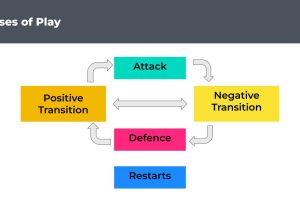How to Become a Non-League Soccer Coach: A Comprehensive Guide
If you have a passion for soccer and want to share your knowledge and experience with others, becoming a non-league soccer coach might be the perfect career for you. Coaching a non-league soccer team can be a rewarding experience that allows you to help players improve their skills and achieve their goals. However, becoming a coach requires more than just a love of the game.
| Passion | Coaching soccer requires a deep passion for the game. As a coach, you will be responsible for developing players’ skills, improving their performance, and helping them achieve their goals. If you have a passion for soccer and enjoy teaching others, coaching may be the perfect career for you. |
| Soccer Coach | As a non-league soccer coach, you will be responsible for developing training sessions, preparing drills and exercises, improving the team’s conditioning, coming up with tactics, deciding upon a formation and starting line-up, giving team talks, and evaluating performances. You will also need to provide feedback to the players and keep detailed records. |
| Coaching Qualifications | To become a non-league soccer coach, you will need to have coaching qualifications. The first qualification you need is the FA course, which covers both the theory and practical elements of soccer coaching. Once you have completed the FA course, you can earn additional coaching qualifications through the National Soccer Coaches Association of America (NSCAA). |
| Career | Coaching non-league soccer can be a rewarding career that allows you to share your passion for the game and help players achieve their goals. However, it requires dedication, hard work, and a commitment to ongoing learning and development. If you are willing to put in the effort, becoming a non-league soccer coach can be a fulfilling and satisfying career choice. |
To become a non-league soccer coach, you will need to have coaching qualifications. The first qualification you need is the FA course, which is a 32-hour course that covers both the theory and practical elements of soccer coaching. During the course, you will learn about first aid, defense, attack, pass and control, shooting, and more. Once you have completed the FA course, you can earn additional coaching qualifications through the National Soccer Coaches Association of America (NSCAA).
Qualifications and Prerequisites
Coaching Qualifications
To become a non-league soccer coach, it is important to have a coaching qualification. The first FA course is the only qualification that you need to manage a non-league football team. It costs around £150 – £200 and requires 32 hours of education in both the theory and practical elements of football coaching. During this course, you will learn about first aid, defense, attack, pass and control, shooting, and more.
Application
To apply for the FA course, you must be at least 16 years old and have a passion for soccer. You do not need any previous coaching experience to apply for this course. However, it is recommended that you have some experience playing soccer or coaching at a grassroots level.
Pre-requisites
Before applying for the FA course, you must complete the FA Safeguarding Children Workshop and hold an in-date FA Emergency Aid Certificate. You can find more information about these prerequisites on the FA website.
Coaching Badges
Once you have completed the FA course, you can work towards obtaining coaching badges. The United States Youth Soccer Association offers six different certifications, ranging from A to F. To coach at a youth club level, you must earn an E or F certification. National level coaching requires a C, B or A certification. UEFA also offers coaching licenses, which are available as follow-on courses for more experienced coaches.
Expertise
To become a successful non-league soccer coach, it is important to have expertise in the sport. This includes knowledge of the rules and regulations, as well as tactics and strategies. It is also important to have good communication skills and be able to motivate and encourage players.
| Qualification | Requirements |
|---|---|
| FA Course | At least 16 years old, completed FA Safeguarding Children Workshop, in-date FA Emergency Aid Certificate |
| Coaching Badges | Earn an E or F certification to coach at a youth club level. National level coaching requires a C, B or A certification. |
| Expertise | Knowledge of the rules and regulations, tactics, strategies, good communication skills, and ability to motivate and encourage players. |
Skills and Knowledge
Technical Skills
As a non-league soccer coach, I need to have a good understanding of the game and its technical aspects. This includes knowledge of different formations, tactics, and strategies that can be used to win games. I need to have a good understanding of the rules of the game and how to apply them in different situations. In addition, I need to have good technical skills such as dribbling, passing, shooting, and tackling, which I can teach my players.
It is also important for me to keep up with the latest developments in the game, such as new techniques and training methods. This can be achieved by attending coaching clinics, reading books and articles, and watching games and training sessions. By doing so, I can continue to improve my technical skills and knowledge, which will enable me to be a better coach.
Communication Skills
Good communication skills are essential for any coach. As a non-league soccer coach, I need to be able to communicate effectively with my players, assistant coaches, and other team officials. This includes being able to give clear instructions, provide feedback, and motivate my players.
Active listening is also important, as it allows me to understand my players’ concerns and address them appropriately. I need to be able to communicate with players of different ages, backgrounds, and skill levels. By doing so, I can create a positive and inclusive team environment that fosters growth and development.
Physical and Psychological Skills
As a coach, I need to have good physical and psychological skills. This includes being able to manage my time effectively, maintain my energy levels, and handle stress and pressure. I also need to be able to lead by example, by demonstrating good sportsmanship, discipline, and work ethic.
Psychologically, I need to be able to understand my players’ needs and motivations, and help them develop a positive mindset that will enable them to perform at their best. This includes being able to provide emotional support, build confidence, and help players overcome obstacles and setbacks.
| Skills and Knowledge | Examples |
|---|---|
| Technical Skills | Understanding of game, knowledge of formations, tactics and strategies, good technical skills such as dribbling, passing, shooting and tackling |
| Communication Skills | Clear instructions, active listening, ability to communicate with players of different ages, backgrounds and skill levels |
| Physical and Psychological Skills | Effective time management, good sportsmanship, ability to provide emotional support and build confidence |
Strategies and Techniques
Team Strategies
As a non-league soccer coach, it is important to have a solid game plan for your team. One strategy that can be effective is to focus on possession. This means that your team aims to keep the ball for as long as possible, which can tire out the opponents and create scoring opportunities. Another strategy is to play a high-pressure game, where your team aggressively tries to win back the ball as soon as it is lost. This can disrupt the opponent’s game and create turnovers in their half of the field.
It is also important to communicate your strategies to your team clearly and effectively. Make sure that your players understand their roles and responsibilities on the field. Consider using visual aids, such as diagrams or videos, to help your team understand the tactics you want to implement.
Opponent Analysis
Analyzing your opponents is a crucial part of preparing for a game. By studying their strengths and weaknesses, you can create a game plan that maximizes your team’s chances of success.
One technique for analyzing opponents is to watch game footage. Look for patterns in their play, such as how they build up their attacks or how they defend against set pieces. You can also scout your opponents in person, by attending their games or watching them train. This can give you a better understanding of their style of play and individual players.
Advanced Techniques
Once your team has mastered the basics, it’s time to introduce more advanced techniques. One technique is the use of set pieces, such as free kicks and corner kicks, to create scoring opportunities. Another technique is the use of off-the-ball movement, where players make runs to create space and confusion in the opponent’s defense.
Consider using drills and exercises in training to help your team develop these advanced techniques. For example, you can practice free kicks and corner kicks in training, or create exercises that focus on off-the-ball movement and creating space.
| Strategies and Techniques | Examples |
|---|---|
| Team Strategies | Focus on possession, play a high-pressure game |
| Opponent Analysis | Watch game footage, scout opponents in person |
| Advanced Techniques | Use of set pieces, off-the-ball movement |
Coaching Practices
Coaching practices are essential to develop a team’s skills and abilities. As a non-league soccer coach, there are several coaching practices that you can use to help your team improve their performance. Here are some sub-sections to consider:
Youth Coaching
When coaching youth soccer, it is essential to focus on the basics of the game. Teach your players how to dribble, pass, and shoot the ball. You can also use small-sided games to help your players develop their skills while having fun. Encourage your players to ask questions and provide feedback to help them improve.
Assistant Coaching
As an assistant coach, your role is to support the head coach in developing and implementing the team’s strategy. You can help with training sessions, game analysis, and player development. Communicate with the head coach to ensure that you are on the same page and working towards the same goals.
Football Coaching
When coaching non-league soccer, it is essential to focus on the team’s strengths and weaknesses. Analyze your team’s performance and identify areas for improvement. Develop a game plan that plays to your team’s strengths and helps mitigate their weaknesses. Use drills and exercises to help your players improve their skills and abilities.
| Coaching Practice | Description |
|---|---|
| Youth Coaching | Focuses on the basics of the game and uses small-sided games to develop skills |
| Assistant Coaching | Supports the head coach in developing and implementing the team’s strategy |
| Football Coaching | Analyzes the team’s performance, develops a game plan, and uses drills to improve skills |
By using these coaching practices, you can help your team improve their performance and achieve their goals. Remember to communicate with your players and other coaches to ensure that everyone is on the same page. With hard work and dedication, you can help your team become successful.
Success Factors
As a non-league soccer coach, success can be measured in different ways. However, there are some key factors that can help you achieve success and build a strong team. These factors include motivating players, building relationships, and keeping records.
Motivating Players
Motivating your players is crucial to their success on the field. As a coach, I believe that motivation comes from setting clear goals and expectations. I also try to create a positive and supportive environment where players feel comfortable and confident. Encouraging players to set their own goals and celebrating their achievements can also be great motivators.
Another way to motivate players is to create healthy competition. I like to split the team into smaller groups and have them compete against each other in drills or scrimmages. This not only fosters a competitive spirit but also helps players bond and work together as a team.
Building Relationships
Building strong relationships with your players is essential to creating a positive team culture. I make an effort to get to know each player individually, their strengths and weaknesses, and what motivates them. This helps me tailor my coaching approach to each player and build trust and respect.
Communication is also key to building strong relationships. I encourage open and honest communication between myself and the players, and among the players themselves. This helps to create a supportive environment where players can express their concerns and ideas.
Record Keeping
Keeping accurate records is important for tracking progress and making informed decisions. I like to keep detailed records of each player’s performance, including their strengths and weaknesses, and any areas that need improvement. This helps me tailor my coaching approach and make adjustments as needed.
Record keeping also includes keeping track of team statistics, such as wins, losses, and goals scored. This information can be used to identify areas that need improvement and to set goals for the team.
| Success Factors | Examples |
|---|---|
| Motivating Players | Setting clear goals and expectations Creating a positive and supportive environment Encouraging healthy competition |
| Building Relationships | Getting to know each player individually Encouraging open and honest communication Building trust and respect |
| Record Keeping | Keeping detailed records of player performance Tracking team statistics Identifying areas that need improvement |
Additional Skills and Responsibilities
As a non league soccer coach, there are additional skills and responsibilities that you need to have to ensure the success of your team. These include:
First Aid
It is important to have basic knowledge of first aid as a coach. You should be able to recognize and treat minor injuries such as cuts, bruises, and sprains. You should also know how to handle more serious injuries such as concussions and fractures. As a coach, you are responsible for the safety of your players, and being knowledgeable in first aid can help prevent injuries from becoming worse.
Social Skills
As a coach, you need to have good social skills. You should be able to communicate effectively with your players, assistant coach, and parents. You should be able to motivate and encourage your players, and be able to handle conflicts that may arise. Good social skills also involve being approachable and creating a positive team atmosphere.
Parents
Parents are an important part of your team, and it is important to have good relationships with them. You should be able to communicate effectively with parents, and be able to address any concerns they may have. It is also important to involve parents in team activities, such as volunteering at games or practices.
Feedback
Providing feedback to your players is an important responsibility as a coach. You should be able to give constructive feedback that helps your players improve their skills. You should also be able to provide positive feedback to encourage your players and boost their confidence. Feedback should be given in a respectful and professional manner, and should be tailored to each individual player.
| Skills and Responsibilities | Examples |
|---|---|
| First Aid | Knowing how to treat minor injuries, recognizing more serious injuries, ensuring player safety. |
| Social Skills | Effective communication, motivation, handling conflicts, approachability, creating a positive team atmosphere. |
| Parents | Effective communication, addressing concerns, involving parents in team activities. |
| Feedback | Constructive feedback, positive feedback, tailored to each individual player, given in a respectful and professional manner. |








